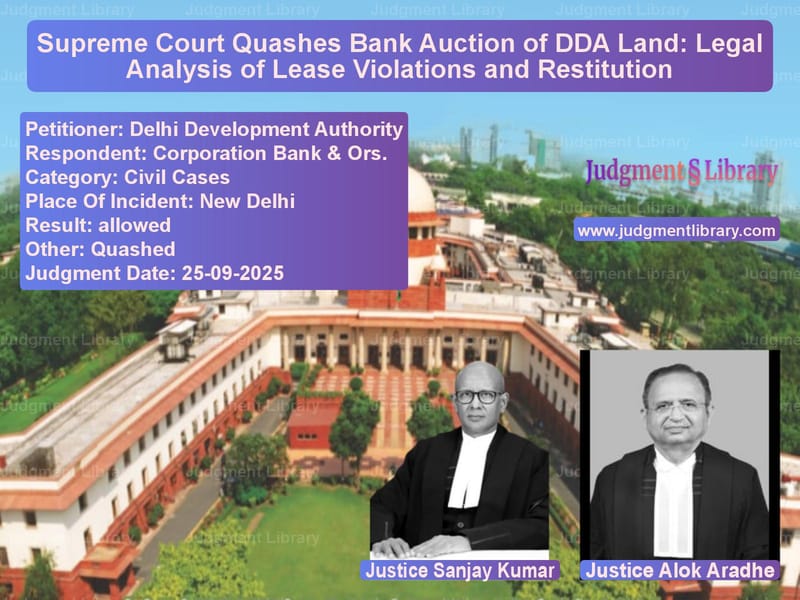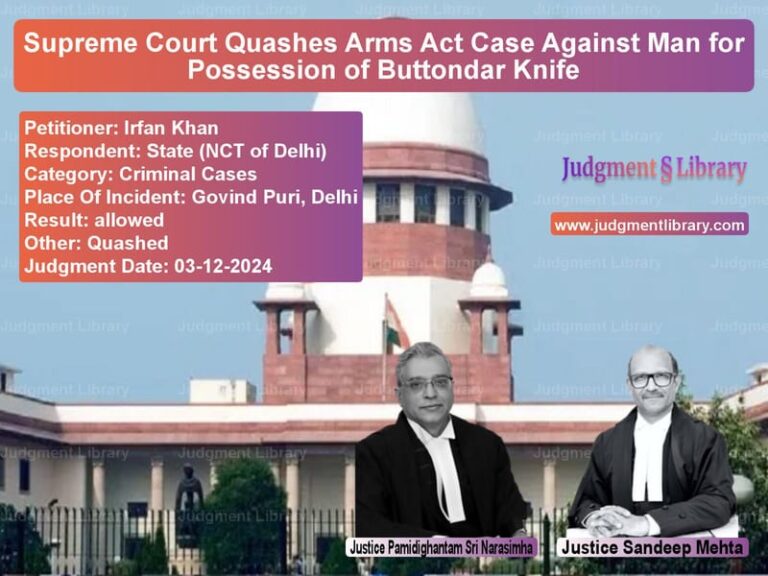Supreme Court Quashes Bank Auction of DDA Land: Legal Analysis of Lease Violations and Restitution
In a landmark judgment that underscores the importance of following legal procedures in property transactions, the Supreme Court of India has quashed an e-auction conducted by Corporation Bank for a Delhi Development Authority plot. The case, which spanned over two decades, brings to light critical questions about the duties of lessees, the responsibilities of banks handling public money, and the protection of innocent third parties who participate in auctions in good faith.
The legal saga began in 2001 when DDA allotted Plot No. 25 at Facility Centre-33 Kalindi Kunj Road, Jasola, New Delhi to Sarita Vihar Club on leasehold basis for constructing a recreational and sports club. The lease agreement contained a crucial clause requiring previous written consent of the Lieutenant Governor of Delhi for any mortgage or charge on the property. This clause would become the central point of contention in the years to follow.
The club applied for a loan from Corporation Bank and sought DDA’s permission for mortgaging the plot. DDA granted a no objection certificate in February 2002, but with a specific condition that permission for mortgage would be issued only after execution and registration of the lease deed. The perpetual lease deed was eventually executed on January 28, 2005, containing Clause 5(b) that explicitly mandated previous consent in writing of Lieutenant Governor for mortgage or charge of the subject plot.
Despite this clear requirement, the club mortgaged the plot with Corporation Bank without obtaining the necessary consent. The bank, in turn, informed DDA about the mortgage in March 2005. The critical failure here was that neither the club nor the bank ensured that the mandatory permission from the Lieutenant Governor was obtained before creating the mortgage.
When the club defaulted on its loan repayment, the bank initiated recovery proceedings before the Debts Recovery Tribunal. The DRT allowed the bank’s application in August 2010, and recovery proceedings began. It was at this stage that DDA first raised objections, informing the Recovery Officer in February 2011 that the club had not sought permission for mortgage and therefore the mortgage in favor of the bank was illegal and void.
The legal arguments presented by DDA were compelling. The appellant argued that the terms of the lease deed specifically stipulated that a mortgage or charge had to be created only with prior consent in writing of the Lieutenant Governor. DDA contended that no such consent was obtained before creating the mortgage in favor of the bank. The authority also emphasized its statutory dues, particularly the unearned increase amount that it was entitled to recover. DDA pointed out that it had informed the bank about the amount of unearned increase due in July 2011. The appellant strongly argued that the bank had committed multiple illegalities from the stage of loan application till the sale of land, and that the bank had disbursed the loan without proper intimation to DDA.
The bank presented a different perspective. It argued that DDA had maintained complete silence from 2005 when informed about the mortgage until 2011 when it first appeared before the Recovery Officer. The bank emphasized that the auction notice clearly stated that the plot was being sold on as is where is basis, and DDA could have exercised its pre-emptive right to purchase the plot through auction to recover its dues. The bank also pointed to the no objection certificate granted by DDA in principle in February 2002 and argued that DDA was aware of the bank’s lien on the subject plot.
The auction purchaser, M/s Jay Bharat Commercial Enterprises Pvt. Ltd., found itself in an unfortunate position. The company had participated in the e-auction in good faith, emerged as the highest bidder with a bid of Rs. 13.15 crores against the reserve price of Rs. 8.85 crores, deposited the sale proceeds, obtained a sale certificate, and even took possession of the property. The auction purchaser argued that the sale violated the provisions of the Second and Third Schedule to the Income Tax Act, 1961, and that neither the sale proclamation disclosed DDA’s quantified claim nor did the reserve price reflect the market value that DDA claimed.
The Supreme Court’s analysis of the legal provisions was particularly insightful. The Court examined Section 29 of the Recovery of Debts Due to Banks and Financial Institutions Act, 1993, which makes provisions of the Second and Third Schedules to the Income Tax Act, 1961 applicable to sales of immovable property under the 1993 Act. Rule 53 of the Second Schedule mandates that a proclamation of sale must specify any other thing which the Tax Recovery Officer considers material for a purchaser to know in order to judge the nature and value of the property.
The Court made several crucial observations in its judgment. It noted that the e-auction notice was issued in violation of Rule 53 of the Second Schedule as well as Rule 16 of the Income Tax Rules, 1962. The fact that DDA had an encumbrance in the form of a claim for unearned increase was not disclosed in the e-auction notice. The bank also failed to disclose the terms and conditions of the lease to the Recovery Officer, despite its undertaking before the High Court.
The Court addressed the issue of res judicata raised by the High Court, referring to the Constitution Bench judgment in Daryao & Ors. v. State of U.P. and Ors. The Supreme Court clarified that since the earlier writ petition was withdrawn based on the bank’s undertaking and not decided on merits, the principles analogous to Section 11 of CPC did not apply. The auction conducted in violation of the lease terms gave DDA a fresh cause of action.
Perhaps the most significant part of the judgment deals with the position of the auction purchaser. The Court observed that among all the actors in this legal drama, the auction purchaser alone stands innocent. The Court referenced the principle of restitution, noting that any civilized system of law is bound to provide remedies for cases of unjust enrichment. The Court stated that the principle of restitution flows from the very heart of justice that no one shall unjustly enrich himself at the instance of another.
The Supreme Court’s final decision was comprehensive and just. The Court quashed and set aside the High Court’s order, the e-auction notice, the e-auction conducted by the Recovery Officer, and the confirmation of sale and sale certificate issued in favor of the auction purchaser. The Court directed the bank to refund the entire amount deposited by the auction purchaser with interest at 9% per annum from the date of deposit till repayment.
This judgment serves as an important reminder about the significance of following legal procedures in property transactions, particularly when dealing with leasehold properties owned by government authorities. It emphasizes the duties of banks as custodians of public money to exercise due diligence before advancing loans and creating securities. Most importantly, it protects the interests of innocent third parties who participate in legal processes in good faith, ensuring that they are not made to suffer for the lapses of others.
The case also highlights the importance of complete disclosure in auction proceedings. When public auctions are conducted, particularly for properties with complex legal histories, full transparency about encumbrances and claims is essential to ensure that bidders can make informed decisions. The failure to disclose material information not only vitiates the auction process but also undermines public confidence in legal recovery mechanisms.
In the end, the Supreme Court’s judgment balances the rights and responsibilities of all parties involved – protecting DDA’s legitimate claims as custodian of public property, holding the bank accountable for its failure to follow due process, and ensuring that the innocent auction purchaser is adequately compensated for being caught in a legal dispute not of its making.
Petitioner Name: Delhi Development Authority.Respondent Name: Corporation Bank & Ors..Judgment By: Justice Sanjay Kumar, Justice Alok Aradhe.Place Of Incident: New Delhi.Judgment Date: 25-09-2025.Result: allowed.
Don’t miss out on the full details! Download the complete judgment in PDF format below and gain valuable insights instantly!
Download Judgment: delhi-development-au-vs-corporation-bank-&-o-supreme-court-of-india-judgment-dated-25-09-2025.pdf
Directly Download Judgment: Directly download this Judgment
See all petitions in Property Disputes
See all petitions in Lease Agreements
See all petitions in Debt Recovery
See all petitions in Contract Disputes
See all petitions in Damages and Compensation
See all petitions in Judgment by Sanjay Kumar
See all petitions in Judgment by Alok Aradhe
See all petitions in allowed
See all petitions in Quashed
See all petitions in supreme court of India judgments September 2025
See all petitions in 2025 judgments
See all posts in Civil Cases Category
See all allowed petitions in Civil Cases Category
See all Dismissed petitions in Civil Cases Category
See all partially allowed petitions in Civil Cases Category







